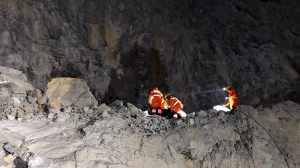Report confirms US right to be worried about Iran: Hadley
Trying to put on a best spin on a new US intelligence report, a top US official said it only confirmed that Washington was 'right to be worried' about Tehran seeking to develop nuclear arms.

Trying to put on a best spin on a new US intelligence report that Iran halted its atomic weapons programme four years ago, a top American official on Tuesday said it only confirmed that Washington was “right to be worried” about Tehran seeking to develop nuclear arms.
The remarks by President George W Bush’s National Security Advisor Stephen Hadley came as a top Democrat asserted that he sought the National Intelligence Estimate (NIE) report to prevent the Bush Administration from having another “run-up” to something like it did in the Iraq war.
“I asked for it because I did not want another run-up that the President proved he was very good at doing beginning the Iraq war…They’re pretty good at running a country up into a war. I wanted to make sure that we didn’t do the same in Iran,” Democrat leader in the Senate Harry Reid said.
“Basically, early reports of the NIE judges that Iran halted its nuclear weapons programme four years ago. I think that indicates that we should do what I have talked about doing for more than a year now: follow the Ronald Regan theory of diplomacy….We should be having a surge of diplomacy with Iran,” Reid told reporters.
But Hadley had a different take on the issue, stressing that the NIE only confirmed that Washington was “right to be worried” about Iran seeking to develop nuclear weapons.
Hadley maintained that the intelligence estimate “offers grounds for hope that the problem can be solved diplomatically – without the use of force – as the Administration has been trying to do.”
The latest report said Iran halted its nuclear weapons programme in late 2003 under international pressure but is continuing to enrich uranium keeping the option open to develop atomic weapons.
The official spin from the highest levels of the administration has been that the document by the intelligence community only validates the Iran policy.
“I don’t think we were wrong about what it’s (Iran) doing or what its intentions were. Our concern was that they were pursuing a nuclear weapon. We saw the enrichment, which we couldn’t really explain,” Hadley said.
“We saw the ballistic missiles. And it led people to conclude we are concerned that they were pursuing a nuclear weapons programme and might have a covert programme to actually weaponise highly enriched uranium in order to be a nuclear weapon,” he maintained at a briefing.
“And that’s what the NIE has now discovered. The president said some months ago, probably over a year ago, we need to have better intelligence on Iran’s nuclear programme, we have these suspicions, we have this concerns, we need better intelligence to get greater certainty,” he said.
“The intelligence community increased their efforts. And, lo and behold, in the last few months, we get credible evidence that gives them a high confidence that they had a covert nuclear weapons programme to weaponise weapons-grade, highly enriched uranium into a weapon,” Hadley added.
Hadley stressed that the Administration had not got it “wrong” about Iran. “I would say to you, they got it right, in terms of being concerned about Iran seeking a nuclear weapon. And we continue to be concerned about a nuclear weapon.”
“On balance the estimate is good news. On the one hand, it confirms that we were right to be worried about Iran seeking to develop nuclear weapons. On the other hand, it tells us that we have made some progress in trying to ensure that that does not happen,” Hadley said.



- 01
- 02
- 03
- 04
- 05



























